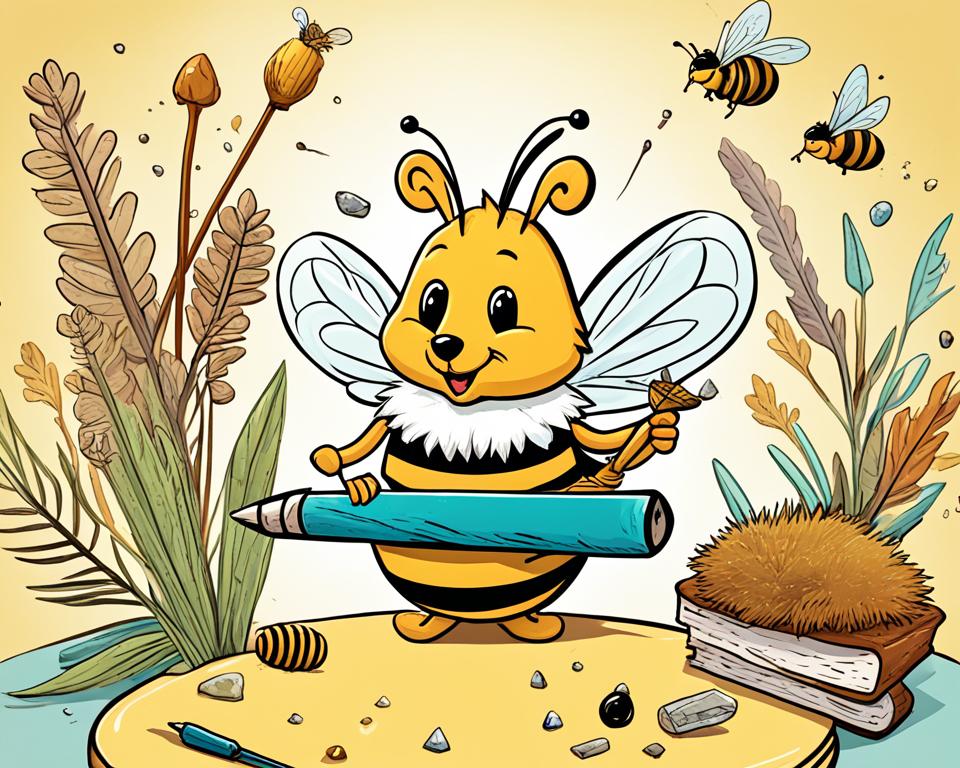The letter “q” can be challenging for kids to learn, but it opens the door to a world of quirky items, queer objects, quick finds, quality products, quiz questions, and even quantum physics concepts. Exploring words that start with “q” can be a fun and educational experience for children, helping them expand their vocabulary and language skills. Whether it’s through tracing and matching activities or introducing them to objects and concepts that start with “q,” there are plenty of opportunities to make learning q words exciting and engaging.
Key Takeaways:
- Learning words that start with “q” can help children improve their vocabulary skills.
- Activities like tracing and matching can make learning q words fun and engaging.
- Objects and concepts that start with “q,” such as quilt, question, and quantum physics, offer real-life examples for teaching.
- Exploring cool words like qualms, quorum, and quixotic can spark children’s curiosity and interest in language.
- Teaching q words in kindergarten and preschool lays the foundation for expanding a child’s language development.
Table of Contents
Q Words for Kids in Kindergarten
Kindergarten is an exciting time for young children to expand their vocabulary and explore new words. Introducing q words can be a fun and engaging way to develop their language skills.
Here are some simple q words that kids in kindergarten can learn:
- Quake – Children can learn about the natural phenomenon of earthquakes and understand how the earth moves.
- Quality – Kids can be encouraged to recognize and appreciate things that are of good quality, such as toys, books, and clothes.
- Quarter – Exploring the concept of quarters can help children understand fractions and basic math concepts.
- Quest – Kids can embark on imaginary quests, encouraging their imagination and problem-solving skills.
- Quick – Teaching the word “quick” can help children understand the concept of speed and encourage promptness in everyday activities.
There are various activities and games that can help children engage with and remember these q words. Tracing and matching activities, word puzzles, and interactive stories can make learning q words enjoyable for kindergartners.
Teaching q words in kindergarten lays a strong foundation for expanding a child’s vocabulary and fostering a love for learning. By introducing interesting words like “quake,” “quality,” “quarter,” “quest,” and “quick,” kids can develop essential language skills that will benefit them throughout their educational journey.
Learning q words in kindergarten is not only educational but also a lot of fun. By incorporating interactive activities and engaging materials, children can enjoy the process of expanding their vocabulary.
Q Words for Kids in Preschool
In preschool, children can start learning words that begin with the letter “q.” It’s helpful to explain to them that “q” is almost always followed by “u” to make words. Some examples of q words for kids in preschool include queen, quiet, query, quilt, and quite.
These words can be taught through sight word activities and by incorporating them into conversations and everyday life. By practicing these words in different contexts, children can develop a better understanding and familiarity with them.
For example, teachers can design activities where children dress up as queens, allowing them to embody the word and deepen their understanding. Additionally, incorporating the words into daily routines, such as asking children to be “quiet” during naptime or discussing a “query” during storytime, helps reinforce their usage and meaning.
By immersing children in an environment where these words are consistently used, their language development and communication skills are enhanced.
“Learning q words in preschool sets a strong foundation for children’s language and vocabulary development. By introducing these words in a variety of engaging activities and incorporating them into daily conversations, children can become confident in using them.”
As children become familiar with q words, they can progress from simple vocabulary recognition to understanding the concepts and relationships associated with these words. This progression can be facilitated through discussions and exploration of related topics.
Examples of Q Words Activities for Preschoolers
Here are some creative and interactive activities that can help preschoolers learn q words:
- Create a quilt together using fabric scraps or paper cutouts. Talk about the different colors and patterns.
- Encourage children to explore sounds by imitating a quack like a duck or a quaver like a singer.
- Play a quiet game, where children have to move silently and only communicate through gestures.
- Engage in pretend play as a queen or king, using props like crowns and capes.
- Ask open-ended questions during circle time or group discussions to encourage critical thinking and language expression.
These activities can make learning q words fun and interactive for preschoolers, fostering their curiosity and love for language.
Q Words for Kids in Preschool
| Word | Meaning |
|---|---|
| Queen | A female ruler or leader |
| Quiet | Creating little to no noise or sound |
| Query | A question or inquiry |
| Quilt | A bed covering made of stitched-together fabric pieces |
| Quite | Truly or completely |
The table above showcases some q words for kids in preschool, along with their meanings. Using these words in activities and conversations can help expand children’s vocabulary and improve their language skills.
Names of Things That Start with Q
When it comes to objects that start with the letter “q,” there is no shortage of interesting and diverse options. Let’s explore some examples of names of things that begin with “q” and how they can enhance your child’s learning experience.
Quilt
A quilt is a cozy and decorative blanket made by stitching together layers of fabric. It often features intricate patterns and designs, making it both functional and visually appealing. Introducing your child to the concept of a quilt can spark their creativity and curiosity about different types of textiles and artwork.
Question
Questions are an essential part of learning and seeking knowledge. By encouraging your child to ask questions, you stimulate their critical thinking skills and foster a sense of curiosity and wonder. Exploring the concept of questioning can open up discussions and encourage independent thinking.
“The art and science of asking questions is the source of all knowledge.” – Thomas Berger
Quicksand
Quicksand is a fascinating natural phenomenon that captures the imagination. It’s a mixture of sand and water that becomes unstable and can trap objects or even people who step into it. Explaining the concept of quicksand to your child can introduce them to the wonders of nature and the importance of being aware of their surroundings.
Queen
A queen is a female monarch who reigns over a kingdom or country. Teaching your child about queens helps them understand different forms of leadership and fosters an appreciation for history and culture. It can also inspire discussions about equality and gender roles.
Quill
A quill is a writing instrument made from a bird’s feather, traditionally used for writing before the invention of pens. Exploring the history of writing tools and introducing your child to the concept of a quill can spark their interest in literature and encourage them to express their thoughts and ideas through writing.
Quarter
The concept of a quarter relates to both time and money. It can refer to a period of 15 minutes or to one of the four equal parts into which something can be divided. Teaching your child about quarters can help them develop their understanding of fractions, time management, and basic financial concepts.
By incorporating concrete examples like quilt, question, quicksand, queen, quill, and quarter, you can make learning words that start with “q” more tangible and relatable for kids. These objects serve as gateways to exploring various topics, from art to history, science to literature. Encouraging curiosity and exploration is key to expanding your child’s knowledge and vocabulary.
Cool Words that Start with Q
The letter “q” is associated with many cool and interesting words. Some examples of cool words that start with “q” include qualms, quorum, quaver, quirk, quicksilver, and quixotic.
These words can pique children’s curiosity and spark their interest in language and vocabulary. Exploring cool words that start with “q” can be a fun and educational way to expand children’s vocabulary and encourage their love for learning.
Why are these words cool?
Let’s take a closer look at some of these cool words:
Qualms: This word refers to feelings of doubt or hesitation. It’s a great word to describe when something doesn’t feel quite right.
Quorum: Quorum is a term used to describe the minimum number of people needed to conduct official business in a group or organization.
Quaver: Quaver is a word that means to shake or tremble, often in reference to a person’s voice or musical note.
Quirk: Quirk is a unique or unusual characteristic or behavior that sets someone or something apart.
Quicksilver: Quicksilver is another name for mercury, a shiny and silvery liquid metal. It’s known for its fast-moving and reflective properties.
Quixotic: Quixotic refers to someone or something that is exceedingly idealistic or impractical. It’s often associated with the adventurous spirit of Don Quixote from Miguel de Cervantes’ novel.
As you can see, these words have intriguing meanings and can add depth to conversations and writing. By introducing cool words that start with “q,” children can expand their vocabulary and express themselves with clarity and creativity.
Conclusion
Learning words that start with the letter “q” can be an engaging and educational experience for children. By incorporating various activities, games, and real-life examples, kids can develop their vocabulary skills, improve their spelling abilities, and enhance their overall language development.
Whether it’s through tracing and matching activities, teaching q words in kindergarten or preschool, exploring objects that start with “q,” or discovering cool words, there are plenty of opportunities to make learning q words fun and exciting.
So dive in and start exploring the world of q words with your child!
FAQ
Are there any fun and engaging activities to help kids learn words that start with “q”?
Yes, activities like tracing and matching can make learning words that start with “q” fun and engaging for children. These activities can help build their vocabulary skills while keeping them entertained.
What are some examples of words that start with “q” for kids?
Some examples of words that start with “q” for kids include quiz, quick, queen, quack, and more. These words can be introduced through various activities and games to help children engage with and remember them.
How can I teach q words to kindergarten kids?
Teaching q words to kindergarten kids can be done through various activities and games. Some simple words that start with “q” for kindergarten kids include quake, quality, quarter, quest, and quick. These words can be introduced and reinforced through fun and interactive exercises.
What q words are suitable for preschool children?
Preschool children can start learning words that begin with the letter “q.” Some examples of q words for kids in preschool include queen, quiet, query, quilt, and quite. These words can be taught through sight word activities and by incorporating them into conversations and everyday life.
Can you give me some examples of objects that start with the letter “q”?
Certainly! Some examples of objects that start with “q” include quilt, question, quicksand, queen, quill, and quarter. These objects can be used to teach children about the letter “q” and expand their knowledge of the world around them.
What are some cool words that start with “q”?
There are many cool and interesting words that start with “q.” Some examples include qualms, quorum, quaver, quirk, quicksilver, and quixotic. Exploring these words can pique children’s curiosity and spark their interest in language and vocabulary.


